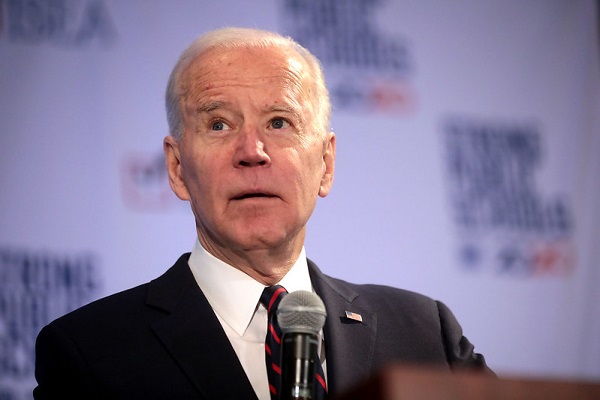
–>
October 19, 2022
Just where did President Biden set the bar for the promise he made?
‘); googletag.cmd.push(function () { googletag.display(‘div-gpt-ad-1609268089992-0’); }); }
On the campaign trail and during the early days of his presidency, President Biden made grandiose promises and assurances to the American people of unity and a return to normalcy and civility. He also added another related promise on Inauguration Day that aides should probably jog his memory on.
During the swearing in ceremony for appointees later that day, President Biden made a promise accompanied by his candid message to nearly 1,000 people that would work for him during his term in office: respect others.
But I am not joking when I say this, if you are ever working with me and I hear you treat another colleague with disrespect … talk down to someone, I promise you I will fire you on the spot. … On the spot. No ifs, ands or buts. Everybody … everybody … is entitled to be treated with decency and dignity. That’s been missing in a big way the last four years.
‘); googletag.cmd.push(function () { googletag.display(‘div-gpt-ad-1609270365559-0’); }); }
It is blunt frankness for a leader to make such a sharp declaration about respectful behavior, but recent events again test his resolve in making such a statement. Earlier this year, in just short of a week, the president’s own treatment of members of the White House press corps was questioned when he called a reporter a “stupid son of a b—-,” called another reporter’s question “stupid,” and suggested that one more might not know how to read in front of press colleagues and peers.
Everyone knew that the president was not going to fire himself for flouting his own pledge then. But this time is different; this time involves one of his Cabinet members.
Over the past week, Americans learned that Homeland Security secretary Alejandro Mayorkas knew early on there was no evidence that Border Patrol agents had “whipped” or “strapped” Haitian migrants at the U.S.-Mexico border in an incident last year that became a flash point in the political wrangling over the southern border and illegal immigration. A September 24, 2021, email to Mayorkas (obtained through the Freedom of Information Act by the Heritage Foundation) from his assistant secretary for public affairs emphasized an interview with the photographer who captured agents on horseback, trying to corral migrants and block them from entering the U.S. near Del Rio, Texas. The photographer who took the images told an interviewer that he and his colleagues did not witness agents harming the migrants.
To make matters worse, it was confirmed Mayorkas was informed that there was no “whipping” just over two hours before he stood next to the president at the White House podium and did not contradict the narrative. During that appearance, he even went so far as to call the images “horrifying” and an example of “systemic racism.” President Biden would go on to excoriate the Border Patrol agents involved and ultimately to promise at the subsequent press conference that “those people [Border Patrol agents] will pay.” Vice President Harris would several days later further denigrate the Border Patrol agents involved, calling the pictures “deeply troubling” and “evoking images of slavery.”
These events all occurred before there was any official investigation of the incident and evidence or corroboration obtained. Claims that agents, who were using long reins to control their horses, were using “whips” were quickly debunked by officials and other agents, but the media, activists, and elected Democrats continued to fuel that narrative. The three agents had, in fact, used cord split reins to control their horses, and no migrants were harmed in the September 19, 2021, incident — but it had taken until June of this year, a full nine months later, for the Customs and Border Protection internal investigation to issue its report.
With doses of common sense, judgment, character, and professional integrity, Secretary Mayorkas could have handled the situation differently. Upon notification of the allegations, Secretary Mayorkas could have informed the president and announced he would have his department fully investigate what had happened, and then — and only then — would his department consider any necessary and appropriate disciplinary action — or public vindication.
‘); googletag.cmd.push(function () { googletag.display(‘div-gpt-ad-1609268078422-0’); }); } if (publir_show_ads) { document.write(“
Instead, Secretary Mayorkas displayed no loyalty to his subordinates, nor faith in an American standard of “innocent until proven guilty.” He, in essence, immediately threw his Border Patrol agents — subordinates under his authority — under the bus. He went ahead with perpetuating accusations of their guilt — reinforced by the president, no less — knowing full well that his Border Patrol agents had committed no inappropriate acts or harmed anyone. Even after the internal investigation report confirmed that the agents had committed no inappropriate acts, Secretary Mayorkas still did not own up to the truth that he, in fact, knew those conclusions early on. He had likely further buckled under political pressure at the time to divert attention away from the crisis at the overflowing makeshift migrant camp at Del Rio.
As a Cabinet member and head of a large government department with thousands of employees, Secretary Mayorkas’s treatment of — and “respect” for — people under his charge is contemptible by any reasonable standard of professional conduct. No government organizational head should so oppose his employees that he would publicly slander them, nor should any employee have to work for a government agency whose appointed head acts against him to the point of lying about him.
Is failure so far to remove Secretary Mayorkas from his Cabinet-level position indicative of a lowered bar the president himself set for “decency and dignity,” to which, he added, “everybody is entitled”? Is it too much for the American public to ask just what it would take to remove Secretary Mayorkas from his Cabinet post if this egregious behavior does not? If President Biden does not remove Secretary Mayorkas from his position for what the military in such circumstances would term “loss of confidence” in his ability to perform his duties, January’s incoming Congress should have the secretary’s impeachment high on their list of priorities to accomplish on day one.
Chris J. Krisinger (colonel, USAF ret.) served in policy advisory positions in the Pentagon and the State Department. He is a graduate of the United States Air Force Academy, attended the Naval War College, and was a National Defense Fellow at Harvard University.

Image: Gage Skidmore via Flickr, CC BY-SA 2.0.
<!– if(page_width_onload <= 479) { document.write("
“); googletag.cmd.push(function() { googletag.display(‘div-gpt-ad-1345489840937-4’); }); } –> If you experience technical problems, please write to [email protected]
FOLLOW US ON
<!–
–>
<!– _qoptions={ qacct:”p-9bKF-NgTuSFM6″ }; ![]() –> <!—-> <!– var addthis_share = { email_template: “new_template” } –>
–> <!—-> <!– var addthis_share = { email_template: “new_template” } –>





